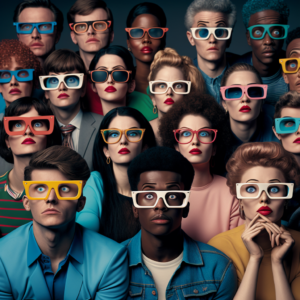
Creative “Slash” Production Agencies
5 Reasons to Choose a Creative Agency with Production Capabilities Over a Traditional Agency. If you’re in the process of choosing a creative agency to
Storytelling has been an integral part of humanity for as long as we’ve been able to communicate with one another. Smoke signals, drawings, and hand signs were all ways humans used to tell stories before we learnt how to communicate with sound.
Heck, some people still story-tell through hand signs and drawings. Storytelling has always mattered – and still very much matters – because it allows us to tap into the one thing that truly connects us all: our humanity. While maybe a bit of a soppy sentiment, it is certainly grounded in truth. Video and film in particular helps us story-tell and evoke emotion in a way words or pictures cannot always do alone.
That’s why as a full-service creative agency, film and video is what we choose to focus on for clients. In fact, there’s a science behind why video storytelling is so powerful (and everything is more believable when there’s a science-backed explanation, right? Yeah science!)

In his essay The Science of Storytelling: What Listening to a Story Does to Our Brains, entrepreneur and storyteller Leo Widrich touched on research which suggested that when humans hear a story, “not only are the language processing parts in our brain activated, but any other area in our brain that we would use when experiencing the events of the story are, too.” When we use sensory details to relay a story (like the client was as excited about the project as if he’d just won a million dollars), it helps engage a listener’s sensory cortex. Or, if you said to your co-worker Jim: “Don’t eat the fish in the office fridge, it’s gone bad”, he might still give it a crack anyway. But if you said to Jim: “Tim was hungry, so he ate the leftover fish in the office fridge. An hour later, he was shooting liquid from both ends”. You get it, right? Odds are Jim will now not eat the fish in the fridge. Basically, when we convey information via a story, the better a listener’s experience and understanding of the message will be.
Although neuroscientists are still debating these findings, just imagine your own past experiences. When someone tells a great story, full of visual details, metaphors and expression, you’re much more likely and easily able to imagine yourself in the same situation. Stories help us understand an experience, without having to live through it. It allows us to empathise, understand and connect on a deeper level. It helps us experience the world, before we’ve even actually experienced it.
But wait, there’s more – especially when it comes to video storytelling.
A neuromarketing study which analysed participants’ brain responses to video ads might also help us understand the science behind the importance of video storytelling. The study found that the presence of a narrative in video ads was strongly linked to the audiences’ preference scores of the portrayed products and the ad itself. Ads where content was structured as narrative significantly stimulated alpha brainwaves, which basically means viewers experienced physical and mental relaxation when watching the ad. What does this mean? It means video storytelling to sell a product is an excellent strategy to trigger the consumers’ brain towards a good experience, leading them to like both the product and the ad.
We all know Nike is a sports apparel and accessories brand. But you wouldn’t always know that from their advertisements. Why? Because what they actually sell is inspiration in the form of stories. Nike’s video ads inspire people from all walks of life to be the best they can be, and in the process have helped people open their hearts (and their wallets).
Cast your mind back to an ad you’ve seen recently – chances are it was an ad that played on your emotions in one way or another. Brands these days are making a play on content that makes people feel, and it works. Think about it: a Qantas isn’t selling you a plane ticket – it’s selling you a dream to be united with family and friends across the globe. Coca Cola doesn’t just sell a soft-drink, it sells “happiness”.
According to HubSpot, there are some emotions and feelings that are more effective and drive certain types of actions, such as:

Alright so now you’re probably wondering how you can start incorporating video storytelling into your brand strategy. When creating videos, you need to have a clear vision of the feeling you want the audience to league with, and how your story will create the emotional undertone that will drive viewers to want to take your intended action.
Humour is an incredibly useful video storytelling tool – especially if you’re in an industry where people might expect things to be more formal. Humour can be shocking, surprising and of course, make you laugh. These are all memorable emotions. Meanwhile, you also want your video to have a beginning, middle and end (it’s what any good story is built on!)
Now, a big one that a lot of brands seem to forget: show, don’t tell. Use visuals and sound rather than stating anything outright. And don’t shove your product in people’s faces – rather include it where it naturally fits in the story.
And finally, you might have a lot of good ideas, but it’s best to keep things simple with one, clear and simple storyline. As Ron Swanson so eloquently states, “Never half-ass two things. Whole-ass one thing”.
Phew, you’ve made it to the end and now you (hopefully) understand why video storytelling matters. It’s a simple yet incredibly effective way to engage, connect and make your brand remain top-of-mind, and top-of-heart.
Related posts

5 Reasons to Choose a Creative Agency with Production Capabilities Over a Traditional Agency. If you’re in the process of choosing a creative agency to

If you’re decently active on social media, you’ve probably heard the news—Instagram is turning into a video-sharing platform. It’s joining the likes of YouTube and

Storytelling has been an integral part of humanity for as long as we’ve been able to communicate with one another. Smoke signals, drawings, and hand
Give us a shout!
Let’s work together on something great.
02 9555 1528
The Creative Foundry is situated on the land of the Wangal and Gadigal peoples of the Eora nation. We acknowledge their connections to land, water and community. We pay our respects to their Elders past, present and emerging. Sovereignty has never been ceded. This always was, always will be, Aboriginal land.
At The Creative Foundry we are committed to providing a safe, inclusive, and culturally sensitive environment for all, no matter the ethnicity, faith, sexuality, disability or gender identity.